LSU Adjunct Professor James Gregory Jr. is being sued by Pennsylvania State Sen. Doug Mastriano for criticism of the senator’s dissertation.
The lawsuit was filed in May and concerns Gregory’s time as a doctoral student at the University of Oklahoma, prior to him being named director of the William A. Brookshire LSU Military Museum last year. Gregory discovered and reported 213 potential cases of fallacies and falsifications in Mastriano’s dissertation on the life of World War I hero Sgt. Alvin York.
Mastriano was the Republican nominee in the 2022 Pennsylvania gubernatorial election, eventually losing to Democrat Josh Shapiro. He alleges that Gregory participated in election interference when he raised concerns about the veracity of Mastriano’s dissertation.
“I was living in Oklahoma, right?” Gregory said. “I don’t care about Pennsylvania politics. It was purely academic. I reported him before he even ran for governor, like a year before.”
In the lawsuit, Mastriano alleges that he has lost the opportunity for “a minimum of $10 million in tourism-related events, validated museum artifacts, book, media, television and movie deals.” Later, the lawsuit goes on to say that Mastriano was negatively impacted with “sleepless nights, physical illness and extreme emotional pain and suffering” as a result of his dissertation being called into question.
“The lawsuit really is, to me, ridiculous on the grounds that it’s not him versus me, it’s him versus his own work,” Gregory said. “He did it, he wrote it. If he’s mad, it should be at himself.”
Listed in the case are a number of defendants, including almost two dozen people who were on the dissertation committee, on the investigation team who looked at his dissertation after it was called into question or who worked at the University of New Brunswick, where Mastriano obtained his doctorate. Also listed as a defendant is the National Research Council of Canada, who urged UNB to put together an investigation for the potential cases of academic misconduct.
Mastriano accuses the defendants of a civil racketeering scheme – a coordinated effort to obtain money through methods such as bribery, fraud or extortion, to name a few. He also claims in the lawsuit that the defendants committed violations of the Sherman Antitrust Act, which says that agreements among competitors to manipulate the market for monetary gain are criminal violations.
The Foundation for Individual Rights and Expression, or FIRE, will represent Gregory, pro bono, for this case. FIRE, a nonprofit civil liberties group, filed a motion to throw out the lawsuit against Gregory on Sept. 19.
FIRE claims that Mastriano’s lawsuit is an example of SLAPP – a Strategic Lawsuit Against Public Participation. Cases of SLAPP are considered to be in conflict with rights provided by the First Amendment. The case will be handled in an Oklahoma court, a state known to have strong anti-SLAPP laws.
“It’s Mastriano suing me basically to say, shut up or shell out,” said defendant Gregory. “If I didn’t have FIRE, I wouldn’t be able to afford it. I just got out of school.”
Gregory says that a lawsuit like this could do a lot more harm later down the road, no matter the outcome.
“This could kill a career. It can stop you from moving on. It can label you as a troublemaker,” Gregory said.
He said it sets a bad precedent and has “so many more implications than someone’s ego being bruised.” He also said it can result in grad students being “terrified to report if they find bad work.”
Since the lawsuit, Gregory has received numerous hate comments and emails from supporters of Mastriano. He showed one featuring a slur at the top of his inbox.
“It was really mean,” he shrugged. “A lot of them are, you know, people that just don’t understand that it’s an academic conversation, and they’re defending politicians.”
An attorney at FIRE, Sara Berinhout, said that something that drew FIRE to Gregory’s case was that “it is, unfortunately, not unique. There are many powerful individuals who seek to abuse our legal system to silence their critics. But academic disputes should be settled in the marketplace of ideas, not the courtroom.”
“A state senator is attempting to abuse our laws to silence and intimidate a Ph.D. student who criticized his scholarship,” Berinhout said. “We hope FIRE’s involvement will help deter future litigants from filing frivolous lawsuits attempting to plead around the First Amendment.”






